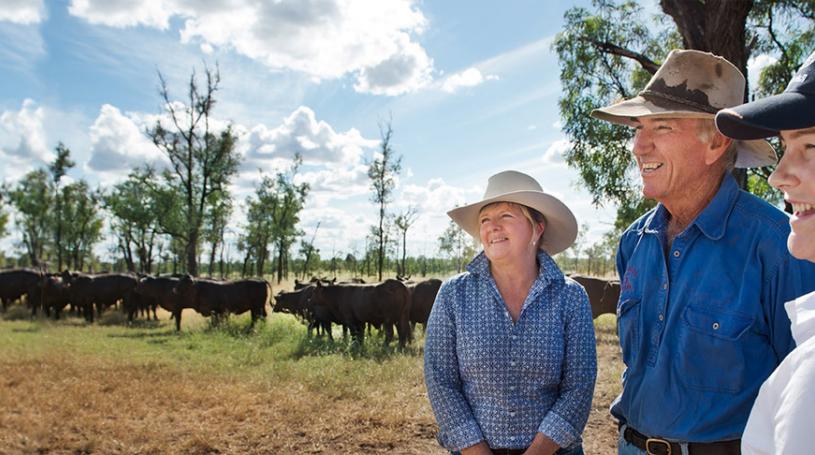2021 - The Year of Farm Expansion

Making the initial decision to grow your farming business is probably the easiest part of the journey – implementing a strategy that is right for your operation can be more challenging.
However, by weighing up the options, with some foresight and planning, the road ahead can run smoothly.
Brad James, Regional Manager Southern QLD/Northern NSW, Rabobank said one of the major pitfalls is not giving sufficient time to formulate the right strategy.
“Australia is a land where the variabilities around weather make a huge difference to profitability, and from recent events we are all too aware of these scenarios and their impacts.”
But the first decision that needs to be addressed before any farming enterprise, or business can move forward is - what are your options, do you expand, do you develop, or do you consolidate?
Mr James said most enterprises, at some stage, either in farming or business, are faced with the critical decisions on how to improve revenue.
“The catalyst, or drivers for such decisions are for a number of reasons, either management of generational assets, trying to expand through economies of scale, or just trying to mitigate risk. Through this process of deliberation we can sometimes get caught up in the notion of expanding….the ‘get bigger’ syndrome. All too often, people feel their sole option is to expand through acquisition of further assets.”
Nailing the right business strategy
While Mr James acknowledges expansion is definitely a strategy to consider, he said sometimes growth can also be achieved by increasing the resources in the existing enterprise.
“It could simply be a matter of diversifying income base or income stream, reviewing the enterprise mix or expanding within the current industry.”
Once the strategy is in place and agreed with the key stakeholders within the enterprise, the next step is creating a business plan.
This is the road map for the future and should include all the budgets, gross margins and sensitivity analysis.
“We tend to focus only on the best outcome when we commit to a plan, after all they are our own ideas and we want them to succeed. But it is vital at this point that we also consider the downside, the ‘what ifs’.”
Mr James said the impact of an adverse circumstance can vary and some, or most, we cannot foresee, nor avoid, but if we have a line of sight on the early warning signs and take an agile approach then we stand the best chance of moderating the impact.
“There is one certainty in all of this, those enterprises with the highest relative levels of gearing feel the impact the most. So keeping up to date with market and commodity trends and knowing when to engage that ‘what if’ strategy is key,” he said.
Mr James also says in these early stages it’s best to involve other parties - including advisors and your bank, or other external key stakeholders.
“Your bank can work with you and whilst not taking a position of advice, can and should review your plans, to ensure that they meet with the enterprise’s ability to handle the necessary commitments associated with the debt needed to be raised to fulfil the goals and strategy of the business plan.”
“This also presents as an opportunity to start researching and reaching out to government agencies and agricultural departments that maintain historical data where you can look at benchmarking, or at least industry average or norms. By taking this into account you can see where you should be pitching average yield and price.”
Farming with Succession
“Succession is another important aspect to review at this time, this is too often overlooked and tends to be a challenge to navigate if it is not planned out early. It does not mean handing control over before you are ready, simply planning and setting out a road map with agreed timelines.”
Rabobank have been helping their farmers stay strong for generations through a focus on succession planning. Our experience has shown that including the next generation in this entire process is vital in getting the first steps of succession under way….essentially bringing all to the table. (Listen to the latest Rabobank Succession Podcast here.)
According to Mr James, Australia is fortunate to have a strong banking sector, willing to assist people to expand through providing the necessary capital to pursue their goals. So it is critical to choose a bank that aligns with your business goals and will be a valued partner in your journey.
His thoughts - look at their overall expertise in agriculture and their long term commitment to the industry, as well their level of knowledge of your specific commodities. It is important to have a valued business partner that understands the vagaries of farming and is there for the long haul.
Visit the Rabobank Knowledge Hub for the latest commodity trends and insights including beef, dairy, grain, horticulture, sheep, wool and more.
The information in this article is not general or personalised professional advice and has not been prepared to be used as the basis for, and should not be used as the basis for any financial or strategic decisions.
Content and references are the author’s own work and may not reflect the views of A Country Practice Accountants Group.

